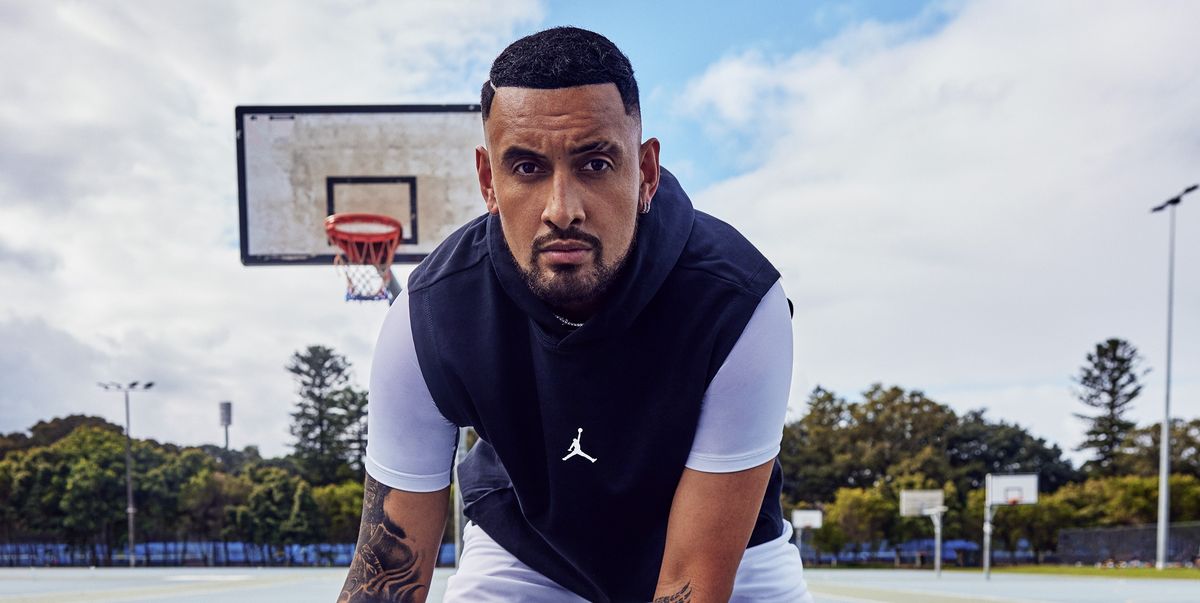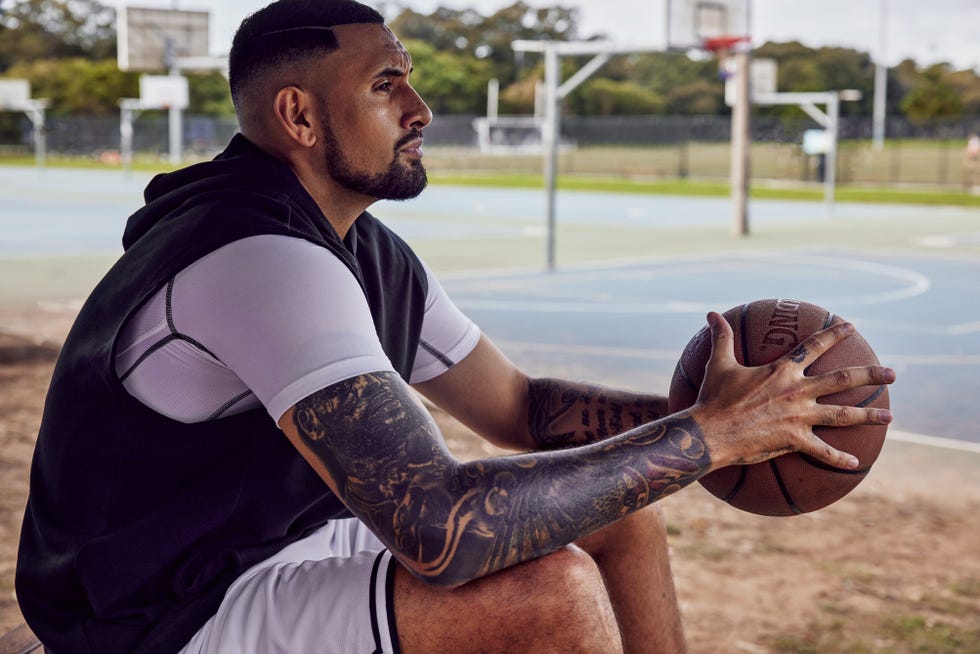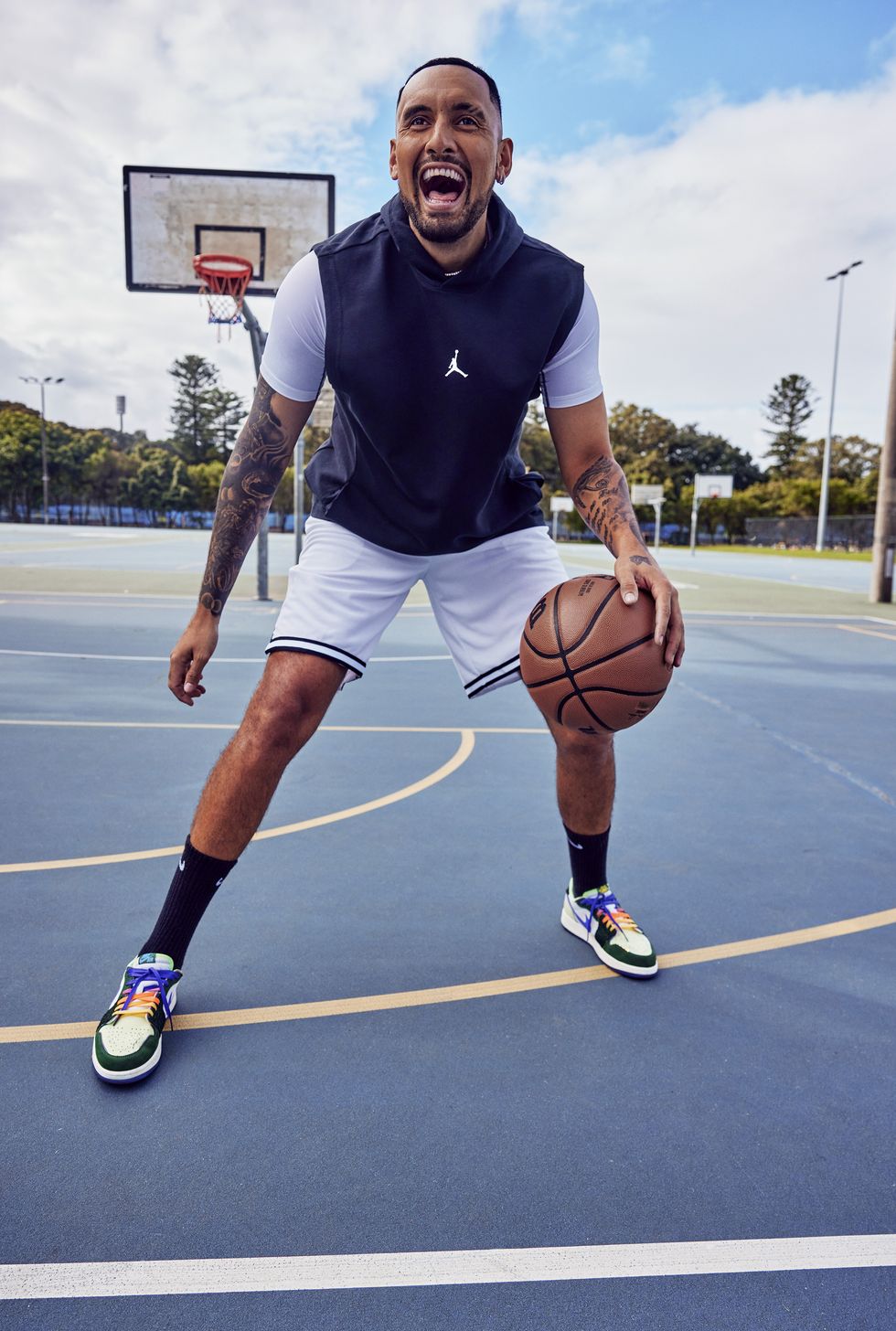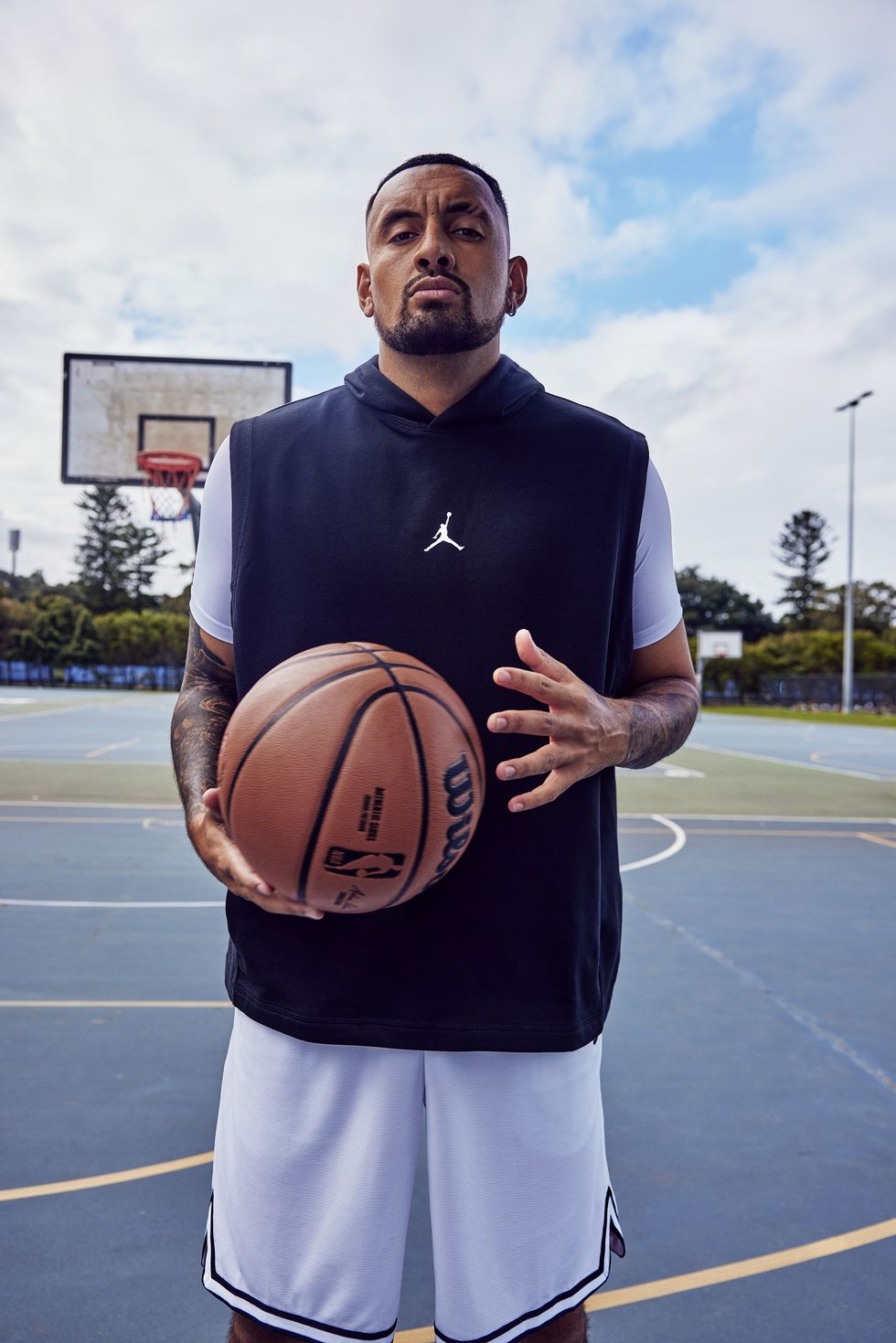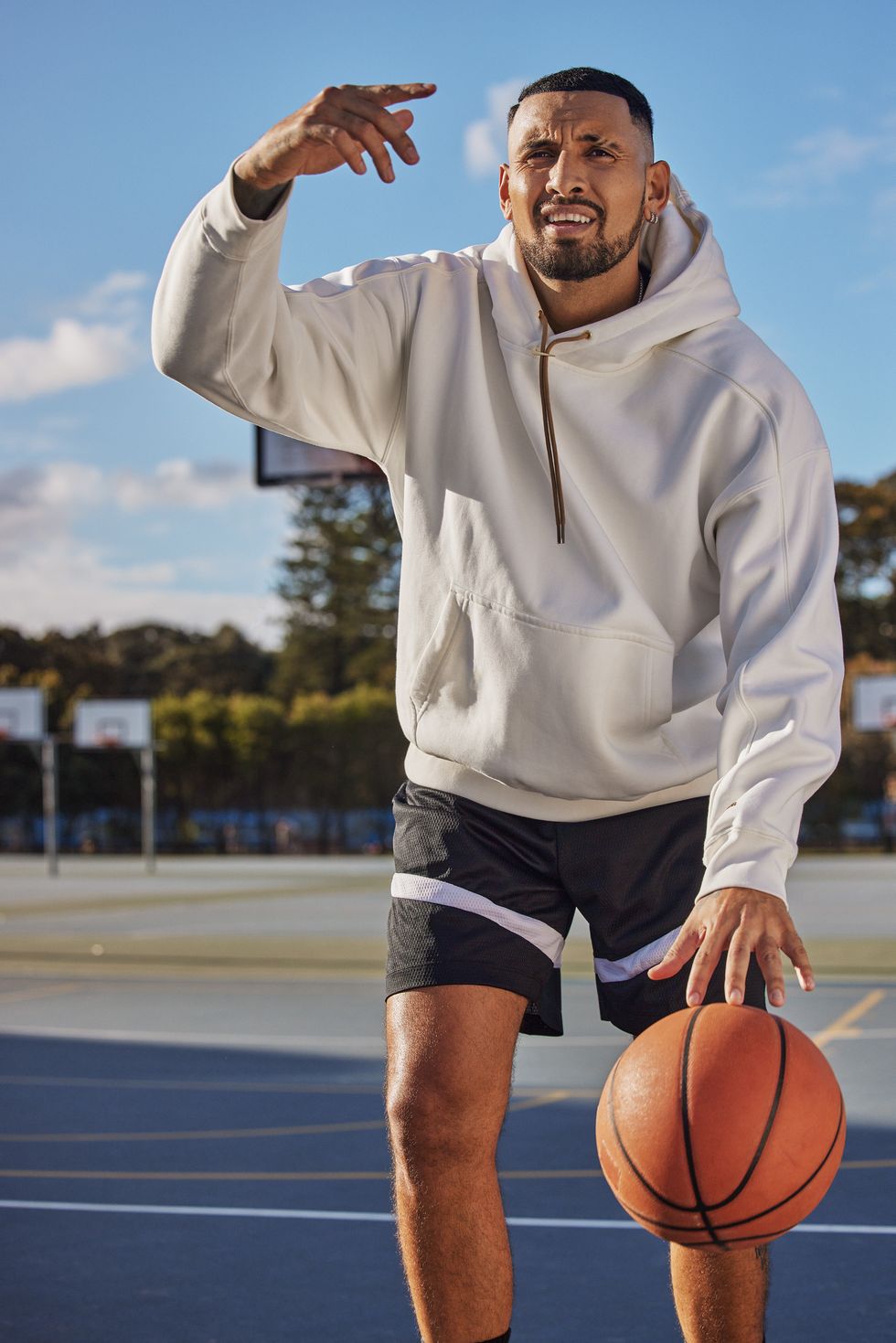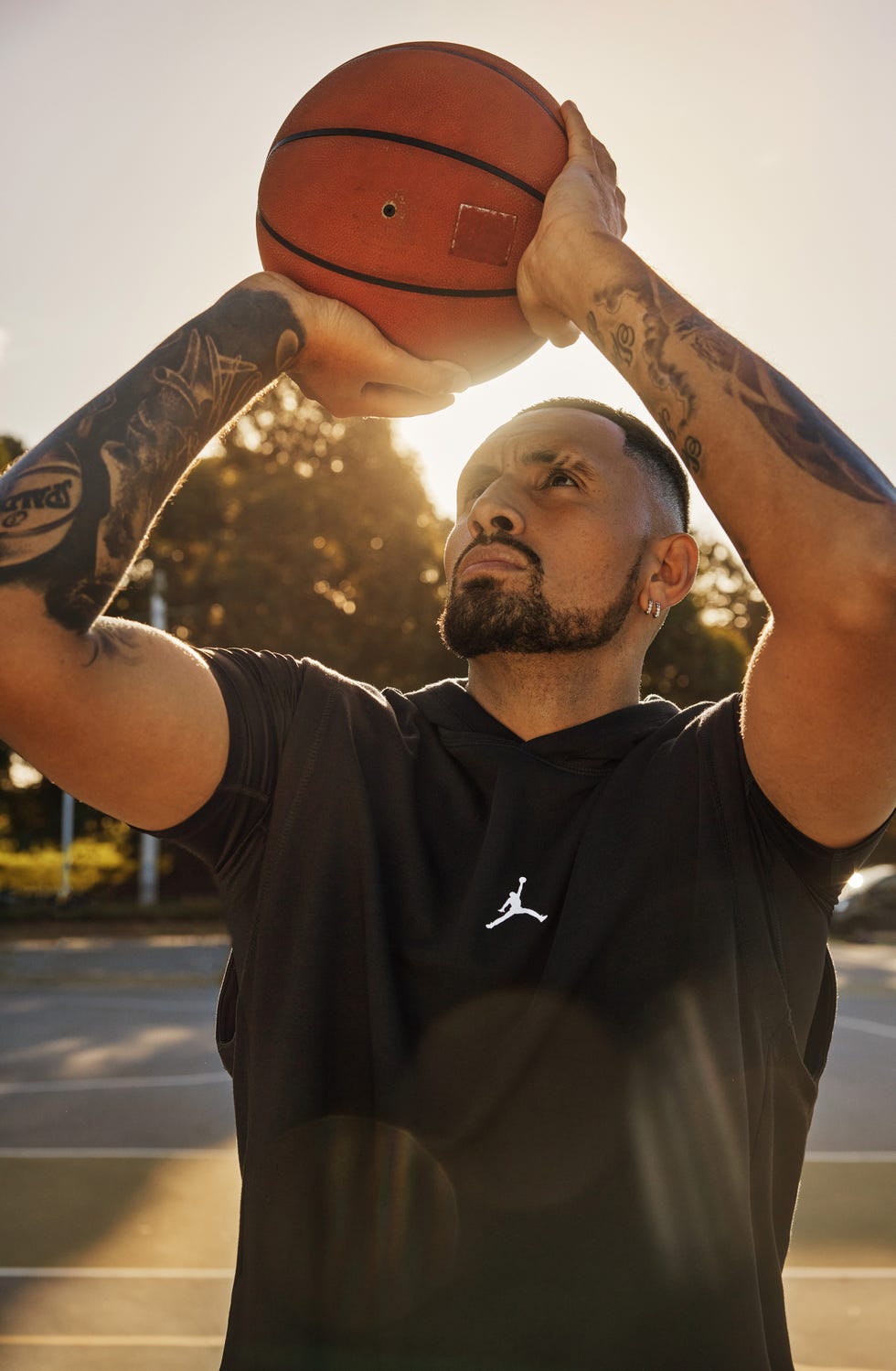This interview is a little different to others I have done for the Talking Heads series, which have been conducted face to face, together in the same room. Instead, this one was on Zoom – me at home in north London, Nick Krygios at home in Sydney, Australia. The so-called ‘bad boy of tennis’. The Australian son of a Greek father and a Malaysian mother who has reached almost McEnroe-level notoriety for his outbursts about rivals – but even more so for his outbursts at officials and fans. A player recognised as one of the finest natural talents the sport has ever known, yet whose commentariat constantly laments his ‘failure to fulfil his true potential’.
He is, after all, one of only two players, along with fellow Australian Lleyton Hewitt, to win his first career meetings with the Big Three of modern tennis – Roger Federer, Rafa Nadal and Novak Djokovic – which suggested a world-beater in the making. He’s won his fair share of tournaments, yet so far a Grand Slam is not among them. The closest he came was at Wimbledon last year, winning the first set against Djokovic, before losing the next three. Now aged 28, he still has time, but he has been dealing with a long-term injury, which has allowed him to catch up on other aspects of his life, and he’s not minded, as you shall see, to take up Djokovic on his offer to be his coach. Uniquely among the top players, he refuses even to have a conventional coach, insisting he knows best how to get the best out of himself.
Until now, I’ve known him only through his playing and his off-court controversies, including an in-court charge of common assault against former girlfriend Chiara Passari (which was later dismissed), a record number of fines on the ATP tour, plus stories of spitting at a fan, masturbating bottles, chucking chairs and calling a referee ‘a fucking tool’. So whatever it was I was expecting, it was not necessarily the thoughtful, considerate and articulate young man coming at me down the Zoom line from the other side of the world. As open and engaging about his own mental health struggles as he was about what he really thinks of the sport that has made him famous, and the big names within it, not least a side to Andy Murray we rarely see.
Alastair Campbell: This series is called Talking Heads, Nick, so describe your own mindset.
Nick Kyrgios: The word that comes to mind is original. I like to do things my own way and I’ve been like that since I was a little kid. A good analogy is that I never stay within the lines. I always challenge, I ask questions. I want to know why I’m doing things, whether that’s about how I go about my everyday life or how I play the game a certain way. So yeah, that’s my mindset: staying original.
AC: And in terms of your success as an athlete, what’s the balance between the role of physical strength and mental strength?
NK: Mental is the most important. The mental aspect of what we do as athletes is key. When you’re in the right mindset, feeling good about yourself, feeling confident, and you believe you’re capable of doing something great, the physical will follow. If, mentally, you’re struggling, the mindset is not right, you’re struggling with confidence or you’re dealing with mental health issues, it’s hard to feel good physically. So mental strength, for sure.
AC: You have a reputation for volatility on court, for having a real temper. Has that been an asset or a handicap to you?
NK: I would say at times it has helped me and at times it hasn’t. Tennis is a very repetitive sport – it’s not easy, it can be very tedious and amazing discipline and amazing patience are required. People see me as volatile, but you don’t make it this far in the sport without composure and patience. I’m actually incredibly patient.
AC: Give me an example of where your temper has helped you.
NK: I feel I’ve always been a perfectionist and, sometimes, to get the best out of myself I have to fire myself up, get out of a rut, lift my energy levels. A mental outburst can get me going. It’s all about balance. All athletes get into a zone and need to be pumped up to some extent.
AC: I’m going to give you two statements and ask you which one applies more to you: ‘I love winning,’ and, ‘I hate losing.’
NK: ‘I hate losing.’ Yeah, hating losing is the closest to me. That goes for anything, in any scenario, whether I’m playing tennis or I’m playing video games. I just can’t stand losing. I do love winning as well, but for me, having the ability to not lose is what suits me.
AC: What about this one: ‘I love tennis,’ or, ‘I hate tennis.’
NK: [Long pause, during which he repeats the question] It’s both. I’ve definitely gone through phases when I’ve loved it and others when I’ve hated it, and sometimes at the same time. So, I love tennis and… [pause] That’s a really hard question. You know, I’m not sure if I can answer it.
AC: When you’re in a phase of hating it, but you have to do it, get out there and play, what’s that like?
NK: It’s torture. It’s not easy. [Pause] It’s really hard. Your energy feels all over the place. You’re not doing it for yourself but for other people. There have, for sure, been moments in my career when I’ve not being playing for myself, and then it’s almost impossible to perform.
AC: Do you have the same love-hate relationship with training?
NK: I love to train, to get out there and reach a point of vulnerability.
AC: And what about your resistance to having a coach? Surely in any elite sport it’s better with a good coach?
NK: I’ve found a way without it. I feel like it’s hard for me to let someone into my team and my experiences. I know my game the best and it’s hard for me to find a coach who will care about my best interests.
AC: What did you make of Novak Djokovic saying he’d like to be your coach?
NK: [Laughs] I think most coaches wouldn’t mind taking me on because it would be a roller coaster and there would be a lot of fun. But I’m not sure Novak would take it too seriously.
AC: Is it possible to make real friends on the tennis circuit?
NK: [Pause] When I stop playing, I think I’ll probably stay in contact with two or three people. So it’s possible. I see these people more than I see my family.
AC: Who is your closest friend on the circuit?
NK: A couple of the Americans – Jack Sock is a good friend – and a couple of my countrymen. It’s hard, though, because it’s such a competitive sport, and you’re all playing against each other every week. You eat with each other, you see each other all the time.
AC: If you never win a Grand Slam, would you consider your life as unfulfilled?
NK: Not at all. I’ve had that conversation with myself and it’s a tough one to have. Every day since I came on the scene, everyone in the sport has had an opinion about me. ‘He’s one of the most talented players… will he ever fulfil his potential… will he this, will he that?’ If you allow their expectations to influence you, you can feel like a failure. But I can look back and I’ve achieved some pretty cool things. I’ve achieved a lot, been on an amazing journey.
AC: Knowing you only from your on-court persona, I’d have said you were a glass-half-empty guy, but listening to you now, you come over as glass-half-full.
NK: I’m definitely a glass-half-full guy. Getting thrown into tennis at 13 or 14 years old and travelling all over the world, seeing some eye-opening things around the world, I look back at my life and my journey so far and realise I’ve been blessed. Everything is a bonus from now.
AC: You have talked about getting depression, and sometimes that has led to self-harming. Tell me about that. How often, how bad and how do you deal with your depression?
NK: I still have to deal with it, but I have steps to deal with it better. If I’m feeling down or not motivated, I’m able to step back and analyse it. The biggest thing now is to ask myself, ‘How do I deal with the way I am feeling?’ I have much better habits now; I’m growing up, maturing. I feel I deal with it better.
AC: Have you ever taken medication for depression?
NK: No. I’ve had it prescribed, been told to take it, but I never did. I felt there were other ways that I could deal with my problems.
AC: Last year you posted a picture of yourself on Instagram, and you said that while you looked okay, it was actually a dark period for you. You were self-harming, having suicidal thoughts, struggling to get out of bed, abusing alcohol and drugs. Tell me how it feels when you have what you call ‘a dark period’. What did that mean at that time?
NK: I was numb. I was running on autopilot every day. I was pushing away family, friends and relationships. My career was on autopilot. I was doing things because I was told to do them. I literally couldn’t feel anything at all. The only time I felt anything was when I was doing those things [self-harm, cutting or burning] or when I was drinking. That’s when I felt okay, and that’s concerning. I was playing in tournaments, thousands of people watching me, and I didn’t feel anything. Most people would feel great being able to do that. I felt terrible. It was a rough time, not pleasant at all, never remotely close to decent.
AC: I describe depression as like feeling dead and alive at the same time.
NK: Yeah, yeah, like numb to everything.
AC: You share management with Naomi Osaka [Japanese player who has spoken of her mental health challenges]. Do you think the sport understands and appreciates the struggles players have? Do you get the support you could have done with?
NK: I don’t think people in general understand how hard this sport is. Especially someone from Australia, like myself, because of the distance from where most tournaments are. We’re on the road seven to eight months of the year, away from family and friends and normality, and the comforts you’re accustomed to. We’re dealing with a lot of pressure, dealing with expectations. I don’t feel people respect the demands, how much it takes out of you mentally and emotionally. With me, people just see the tennis player. ‘Ah, he’s here. He’s turned up. He’s playing in the tournament, he must be okay.’ People don’t see you as a normal human. And I fell to pieces.
AC: Do you think most players struggle psychologically?
NK: Most players do, but I think it’s worse if you come from Australia because of those distances. European players can go home more often, reset, see the special people in their lives after tournaments. Someone like myself doesn’t have that ability.
AC: What makes you angry outside of tennis?
NK: I think the biggest thing about me is that I’m very different off court to on it. I’m very calm. I’m low maintenance. I like playing computer games, I drink a lot of coffee and I like good food. So nothing much makes me angry. I just like to do what I like do. Nothing makes me too emotional. Tennis is the best sport with that because it gives you the ability to step back and analyse and not overreact.
AC: Are you political?
NK: Not really.
AC: But you have a foundation.
NK: Yeah. It gives underprivileged kids an opportunity to play sport and be accepted. In my youth, I didn’t feel accepted. I was a ‘coloured’ kid, a bit overweight. I didn’t feel it was okay for someone like me to go and play sport, so we try to give kids who feel like that the opportunity to get out there and do sport and be the best they can be.
AC: Have you suffered a lot of racism in your life?
NK: I have. I have dealt with bad racism. Australia is a pretty racist country in general, one of the most racist countries in the world.
AC: Still?
NK: Yeah, I think it is. I have grown some thick skin in sport and in life, so I deal with it better than I did. But it’s never easy.
AC: What kind of stuff are we talking about?
NK: Some of the most iconic people in sport in Australia have told me and my family to go back where we came from and this kind of bullshit. Stuff that isn’t acceptable, not acceptable at all.
AC: So your dad’s Greek, and I read your mum, who’s from Malaysia, is connected to some kind of royal family there.
NK: Yeah, but to be honest, I don’t know much about it. I met my mum’s dad just once in my entire life. Just that once and then never met him again.
AC: Why not? Why no family connection?
NK: I don’t know. I guess when she came to Australia, she left it behind. It’s a whole side of my life I never explored.
AC: And your mum never felt the need to educate you about it?
NK: No. My mum is a very big personality. Definitely a personality.
AC: Is that where you get your on-court side from?
NK: Definitely. If people understood my family, they would definitely understand where I get my fiery side. I can’t even explain to you how my brother is – he’s like me times three, crazy, super-intense, energetic in a good way, a prankster, a jokester, all of the above. He’s almost 35 now.
AC: So if that’s from your mum, what about your dad?
NK: My dad is quite gentle. He is a super-generous man, that’s where I get that. The emotional side is my mum.
AC: Are you religious?
NK: I’m not religious. I try to do good and I believe in karma – that if you do good it comes back around – but no, I’m not religious.
AC: Do you cry much?
NK: I do cry, sometimes.
AC: When was the last time you cried?
NK: The last time? [Pause] Not for a while actually, which is not a bad thing – not that it’s a good thing. I’m in an exciting time in my life. I’m in a good relationship with my girlfriend [Costeen Hatzi, blogger and founder of her own home decor business], things are going well with my family, I’m getting my body right, I’m enjoying it all.
AC: You have been off injured for a while. How has that been? Is it not torture not being able to play?
NK: I’ve had an amazing time. If you look back at the last decade of my life, day in day out, week in week out, I’ve been travelling, playing, travelling, playing, not seeing family for months on end, missing significant events, and suddenly I’ve had time to be normal and spend time with the most important people in my life. So you can’t go getting upset about needing rest. I’ve enjoyed it. You have to look at the hand you’re dealt and see what you can do with it. It’s not as if tennis is the only thing I do. I do a lot more than that.
AC: Who would you choose as the greatest sportsman or woman of all time?
NK: I love basketball, so I think I would say LeBron James.
AC: You were a decent basketball player as a kid. Could you have made it as a pro?
NK: There are a lot of leagues around the world; for sure, I could have played somewhere.
AC: What is it about basketball that you love?
NK: The team element. I love team sports. I love the culture around the sport, what they wear, how they’re allowed to show their personalities more than they are, say, in tennis. You see who they are. The whole sneakers thing, the closeness to fans, it feels more connected.
AC: Do you feel tennis is still quite a class-bound sport?
NK: It is. Tennis and I haven’t always agreed. My goal was to bring other fans around the world into tennis. I think a lot of people in tennis want to keep the same people. But you look at other sports, in the US, the UK, they are growing their base. I’m not sure tennis can say the same. We need to explain better, get more people in.
AC: Working-class people?
NK: Not just working-class people. Any people. Tennis is one of the most globally watched sports, played by people from all over the world: Aussies, Americans, Europeans, Africans, Asians. There are so many different personalities and the fan base needs to grow in all those places.
AC: Did I read that you’re a Spurs fan?
NK: Tottenham Hotspur? Yes. Not a massive fan, but yes.
AC: Why?
NK: It’s a funny story, you’ll like this. I play computer games a lot and I used to like Emmanuel Adebayor on Fifa. At the time, he played for Spurs, so I supported them and have never changed.
AC: Back to tennis: describe Djokovic in a word.
NK: I would say the word has changed maybe six times during the time I have known him. But right now, the word is legend. He’s a real legend of the game. What I like about Novak is that he deals with a lot of shit but just keeps going. He has a fan base where a lot of people love him and a lot of people don’t. He sometimes doesn’t know where he can play, what tournament, he deals with a lot of other people’s opinions coming at him, and he just does it. That’s a cool thing.
AC: Roger Federer in a word.
NK: GOAT.
AC: The greatest of all time?
NK: Yes. You’ll never find anyone else who plays like him. So pure, so natural, the way he plays the game… yeah, pure.
AC: Rafa Nadal in a word.
NK: I would say… [pause] Jeez, this is a tough one. [Pause] I’ve never seen anyone so intense in my entire life. He’s an incredible athlete, but yeah, intense.
AC: What about Andy Murray?
NK: An underrated player. And one of the funniest guys I ever met in my life. I know his humour isn’t always appreciated in the UK, but he’s so funny.
AC: He doesn’t have that reputation.
NK: I know. You guys voted him the most boring athlete or some nonsense. I’m telling you, he’s hilarious. The way he tells jokes, really hilarious.
AC: Well, it has been great to talk to you. So different from what I expected.
NK: That’s what my girlfriend thinks, too.
AC: What was she expecting?
NK: I think she thought I was probably a bit too confident. She loves me now, though.
AC: When you look back at some of your more controversial moments – the woman in the crowd who sued you because you said she was drunk; the referees you have abused; the argument with your girlfriend that landed you in court – and the kind of feelings you may have inspired in other people, do you ever wonder whether sometimes you can be so in the moment – in your own personality and feelings – that you underestimate the effect you have on others?
NK: I don’t see myself as being someone who’s really famous. I don’t take myself too seriously. So I can sometimes forget who I am. I learned from all those things, and I think I’m a better person today because of what I learned. All the outbursts are from the earlier stages of my career. My last season on court was amazing, I learned a lot, I was much more composed. But it’s hard being me at times. There’s a lot going on.
